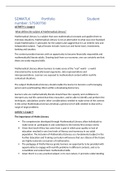SDMATLK Portfolio Student
number: 57530750
ACTIVITY 1.1 page 6
What defines the subject of Mathematical Literacy?
Mathematical Literacy is a subject that uses mathematical concepts and applies them to
everyday situations. Mathematical Literacy is not an alternative to what was once Standard
Grade Mathematics; it advocates for the subject and suggest that it is an entirely new and
independent subject. Typical lessons include: loans (car and home loan), investments,
banking and taxation.
The content provides learners with an opportunity to become financially responsible and
mathematically literate adults. Drawing back from our economy, one can certainly see that
these are sorely required skills.
Mathematical Literacy allows learners to make sense of the “real” world – a world
characterised by numerically based arguments, data representations and
misrepresentations. Learners are exposed to mathematical content within real-life
contextual situations.
The subject Mathematical Literacy should enable the learner to become a self-managing
person and a participating citizen within a developing democracy.
learners who are mathematically literate should have the capacity and confidence to
interpret any real-life context that they encounter, and be able to identify and perform the
techniques, calculations and/or other considerations needed to make sense of the context.
In this sense Mathematical Literacy develops a general set of skills needed to deal with a
range of large problems.
Activity 1.2 page 9
The importance of Maths Literacy
The competencies developed through Mathematical Literacy allow individuals to
make sense of, participate in and contribute to the twenty-first century world.
Given that South Africa has come from a past in which poor quality or lack of
education resulted in very low levels of literacy and numeracy in our adult
population. The inclusion of Mathematical Literacy as a fundamental subject in the
Further Education and Training curriculum will ensure that our citizens of the future
are highly numerate consumers of mathematics.
The pedagogy of Maths literacy grants learners an opportunity to be provided with
opportunities to engage with real-life problems in different contexts, and so to
consolidate and extend basic mathematical skills.
Given that it is a very practical subject, in its own nature, it promote understanding
, Prepares the learners even for outside school and workplace. Mathematical Literacy
should enable the learner to become a self-managing person, a contributing worker
and a participating citizen in a developing democracy. Mathematical Literacy will
ensure a broadening of the education of the learner which is suited to the modern
world.
What role will Maths Lit play
Mathematical Literacy contributes to the economic success.
will result in the ability to understand mathematical terminology and to make sense
of numerical and spatial information communicated in tables, graphs, diagrams and
texts.
Mathematical Literacy will develop the use of basic mathematical skills in critically
analysing situations and creatively solving everyday problems.
Will empower learners to be mathematically literate
Mathematical Literacy contributes to the attainment of the Critical and
Developmental Outcomes in that it enables learners to:
use mathematical process skills to identify, pose and solve problems creatively and
critically;
work collaboratively in teams and groups to enhance mathematical understanding
organise, interpret and manage authentic activities in substantial mathematical ways
that demonstrate responsibility and sensitivity to personal and broader societal
concerns;
collect, analyse and organise quantitative data to evaluate and critique conclusions;
communicate appropriately by using descriptions in words, graphs, symbols, tables
and diagrams;
engage responsibly with quantitative arguments relating to local, national and global
issues;
contributes to entrepreneurial success and career opportunities.
Activity 2.1 page 19
The difference between knowing and understanding
Knowing Understanding
The act of knowing, which is called is processed in the brain. It is
‘knowledge,’ is defined as ‘the defined as ‘a psychological process
expertise and skill acquired by an related to a person, object,
individual through his experiences situation, or messages which
and education.’ require an individual to think and
It includes facts use concepts to deal with.’
and information about certain Also called ‘intellection,’
things of which you are certain understanding involves
about. conceptualization and association.
It involves the basic recall of data It is the awareness of the
which have been previously connection between pieces of
presented. information that are presented and





